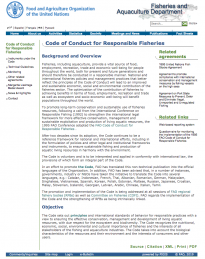Supportive Policy Environment for Misuse of Veterinary Drugs
Policy is a key entry point to stimulate change that brings about reduced food loss and waste (FLW). Policy can be instrumental in controlling FLW resulting from misuse of drugs and other contaminants.
Key policy guidance in terms of aquaculture development is given in the FAO Code of Conduct for Responsible Fisheries. Article 9 recommends:
- 9.4.4: States should promote effective farm and fish health management practices favouring hygienic measures and vaccines. Safe, effective and minimal use of therapeutants, hormones and drugs, antibiotics and other disease control chemicals should be ensured.
- 9.4.5: States should regulate the use of chemical inputs in aquaculture which are hazardous to human health and the environment.
- 9.4.6: States should require that the disposal of wastes such as offal, sludge, dead or diseased fish, excess veterinary drugs and other hazardous chemical inputs does not constitute a hazard to human health and the environment.
- 9.4.7: States should ensure the food safety of aquaculture products and promote efforts which maintain product quality and improve their value through particular care before and during harvesting and on-site processing and in storage and transport of the products.
Policy Formulation
Policy Formulation
Certification has evolved in response to food safety concerns. But the benefits for farmers and local consumers is debatable and should be considered in policy formulation.
The public’s perception of a sector influence both policy formulation and development, both directly and indirectly, of that sector. A proper, pragmatic policy structure is essential to all development, and particularly for primary production sectors. In recent years, the public’s perception of aquaculture has all but tarnished the sector and, in some nations, public outcry has resulted finally in major policy changes. In the new millennium, the sector will have to attempt to clean this tainted image and endeavour to correct the public view on aquaculture. The message in this regard should be that aquaculture is essential to meet human demand for aquatic products and will continue developing as a sector that minimally perturbs the environment; that it can be a gross environmental cleaner, a prudent user of primary resources, and a producer of healthy and nutritious food of high consumer acceptability.
Policy in Practice
Policy in Practice
The FAO/AAHRI Expert Workshop on Improving Biosecurity through Prudent and Responsible Use of Veterinary Medicines in Aquatic Food Production was convened in Bangkok, Thailand, from 15 to 18 December 2009, in order to understand the current status of the use of antimicrobials in aquaculture and to discuss the concerns and impacts of their irresponsible use on human health, the aquatic environment and trade. Such discussions became the basis for drafting recommendations targeted for both government and private sectors and for developing guiding principles on the responsible use of antimicrobials in aquaculture to be considered as part of future FAO Code of Conduct for Responsible Fisheries (CCRF) Technical Guidelines on Prudent and Responsible Use of Veterinary Medicines in Aquaculture.
Additionally, an FAO publication on Responsible and Prudent Use of Veterinary Antimicrobials highlights salient features of fish farming and disease and FAO advocacy, as well as tools and future work in promoting prudent and responsible use of veterinary medicines.
Key Publications
Code of Conduct for Responsible Fisheries This publication is a reference framework for national and international efforts, including the formulation of policies and other legal and institutional frameworks, to ensure sustainable fishing and production of aquatic living resources. | |
A Global Perspective of Aquaculture in the New Millennium Global and regional aquaculture trends are evaluated, and projections, including opportunities, constraints and strategies for achieving the targets presented, are discussed. | |
Responsible And Prudent Use Of Veterinary Antimicrobials: Practical Tools And Experiences Data on aquaculture, disease issues and antimicrobial use and resistance. |
More Resources
More Resources
31 October 2023
01 January 2019














